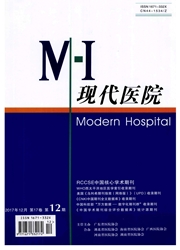

 中文摘要:
中文摘要:
目的 探讨循证护理模式对社区老年高血压患者相关行为的干预效果。方法 按照循证医学系统的评价方法,评价纳入研究的质量,提取有效数据应用于2015年12月在册且符合研究对象的社区老年高血压患者93例(观察组),设立同期对照组94例,予以常规管理,观察其临床疗效,均为期6个月。并采用自编问卷调查表、服药依从性调查表和健康行为量表记录分析干预前后及组间相关信息及数据差异。结果 6个月后,观察组患者血压得到有效地控制或降低,治疗依从性明显提高,体质量指数控制在理想范围,生活习惯、心理应激等相关不健康行为维度得分均低于对照组,差异有统计学意义(P〈0.05),参与活动行为方面差异无统计学意义(P〉0.05)。结论采用循证护理模式对社区老年高血压患者进行干预,可有效控制血压,提高治疗依从性,引导患者选择更积极健康的行为生活方式。
 英文摘要:
英文摘要:
Objective To explore the intervention effect of evidence - based nursing on the health behavior of elderly hypertensive patients in the community. Methods 187 elderly hypertensive patients who were hospitalized in December 2015 and met the inclusive criteria were divided into observation group (72 =93) and control group (72 =94) ? The observation group received evidence - based nursing according to the evidence - based medical system evaluation while the control group was given regular nursing both for 6 months. The clinical efficacy of two nursing modes was observed and the differences be-tween pre - intervention and pose - intervention and groups were recorded and analyzed with a self - designed questionnaire, drug compliance questionnaire and health behavior scale. Results In the observation group, the blood pressure was effec-tively controlled or reduced, treatment compliance was significantly increased and body mass index (BMI) was within the ide-al range 6 months later. Scores of unhealthy behaviors such as those in living habits and mental stress were lower than those in the control group, which showed significant difference (P 〈0. 05). There was no significant difference in activity partici-pation between the two groups (P 〉 0. 05 ) . Conclusion Evidence - based nursing intervention can effectively control the hypertension, improve the treatment compliance of the community elderly hypertension patients and help lead them to a more positive and healthier life style.
 同期刊论文项目
同期刊论文项目
 同项目期刊论文
同项目期刊论文
 期刊信息
期刊信息
